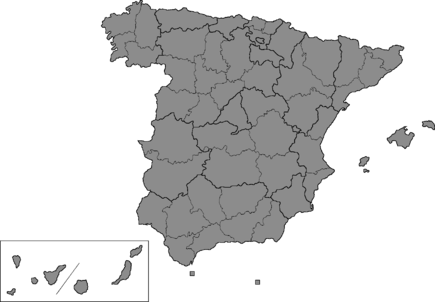Spanish local elections, 2019
|
| |||||||||||||||||||||||||||||||||||||||||||||
| |||||||||||||||||||||||||||||||||||||||||||||
All councillors in municipal councils All seats in 38 provincial deputations | |||||||||||||||||||||||||||||||||||||||||||||
|---|---|---|---|---|---|---|---|---|---|---|---|---|---|---|---|---|---|---|---|---|---|---|---|---|---|---|---|---|---|---|---|---|---|---|---|---|---|---|---|---|---|---|---|---|---|
| Opinion polls | |||||||||||||||||||||||||||||||||||||||||||||
| |||||||||||||||||||||||||||||||||||||||||||||
 Provincial results map for municipal elections | |||||||||||||||||||||||||||||||||||||||||||||
The 2019 Spanish local elections will be held on Sunday, 26 May 2019, to elect all councillors in the municipalities of Spain and all seats in 38 provincial deputations.[2] The elections will be held simultaneously with regional elections in thirteen autonomous communities, as well as local elections in the three foral deputations of the Basque Country, the ten island councils in the Balearic and Canary Islands and the 2019 European Parliament election.[1]
Electoral system
- Municipal elections
Municipalities in Spain are local corporations with independent legal personality. They have a governing body, the municipal council or corporation, composed of a mayor, deputy mayors and a plenary assembly of councillors. Voting for the local assemblies is on the basis of universal suffrage, with all nationals over eighteen, registered in the corresponding municipality and in full enjoyment of all political rights entitled to vote. The mayor is in turn elected by the plenary assembly, with a legal clause providing for the candidate of the most-voted party to be automatically elected to the post in the event no other candidate is to gather an absolute majority of votes.
Local councillors are elected using the D'Hondt method and a closed list proportional representation, with a threshold of 5 percent of valid votes—which includes blank ballots—being applied in each local council. Parties not reaching the threshold are not taken into consideration for seat distribution. Councillors are allocated to municipal councils based on the following scale:
| Population | Councillors |
|---|---|
| <100 | 3 |
| 100–250 | 5 |
| 251–1,000 | 7 |
| 1,001–2,000 | 9 |
| 2,001–5,000 | 11 |
| 5,001–10,000 | 13 |
| 10,001–20,000 | 17 |
| 20,001–50,000 | 21 |
| 50,001–100,000 | 25 |
| >100,001 | +1 per each 100,000 inhabitants or fraction +1 if total is an even number |
Councillors of municipalities with populations below 250 inhabitants are elected under an open list partial block voting, with electors voting for individual candidates instead of parties: for up to four candidates in municipalities with populations between 100 and 250 inhabitants; and for up to two candidates in municipalities below 100. This does not apply to municipalities whose geographical location or the best management of municipal interests or other circumstances make it advisable to be organized through the open council system (Spanish: régimen de concejo abierto), in which voters will directly elect the local major.[3][4][5]
The electoral law provides that parties, federations, coalitions and groupings of electors are allowed to present lists of candidates. However, groupings of electors are required to secure the signature of a determined amount of the electors registered in the municipality for which they are seeking election:
- At least 1 percent of the electors in municipalities below 5,000 inhabitants, provided that the number of signers is more than double that of councillors at stake.
- At least 100 signatures in municipalities between 5,001 and 10,000.
- At least 500 signatures in municipalities between 10,001 and 50,000.
- At least 1,500 signatures in municipalities between 50,001 and 150,000.
- At least 3,000 signatures in municipalities between 150,001 and 300,000.
- At least 5,000 signatures in municipalities between 300,001 and 1,000,000.
- At least 8,000 signatures in municipalities over 1,000,001.
Electors are barred from signing for more than one list of candidates. Concurrently, parties and federations intending to enter in coalition to take part jointly at an election are required to inform the relevant Electoral Commission within ten days of the election being called.[3][4]
- Deputations and island councils
Provincial deputations are the governing bodies of provinces in Spain, having an administration role of municipal activities and composed of a provincial president, an administrative body, and a plenary. Basque provinces has foral deputations instead—called Juntas Generales—, whereas deputations for single-province autonomous communities were abolished: their functions transferred to the corresponding regional parliaments. For insular provinces, such as the Balearic and Canary Islands, deputations were replaced by island councils in each of the islands or group of islands. For Majorca, Menorca, Ibiza and Formentera this figure is referred to in Spanish as consejo insular (Catalan: consell insular), whereas for Gran Canaria, Tenerife, Fuerteventura, La Gomera, El Hierro, Lanzarote and La Palma its name is cabildo insular.
Most deputations were indirectly elected by local councillors from municipalities in each judicial district. Seats were allocated to provincial deputations based on the following scale:
| Population | Seats |
|---|---|
| <500,000 | 25 |
| 500,001–1,000,000 | 27 |
| 1,000,001–3,500,000 | 31 |
| >3,500,001 | 51 |
Island councils and foral deputations are elected directly by electors under their own, specific electoral regulations.[3][4]
Opinion polls
| Polling firm/Commissioner | Fieldwork date | Sample size | Turnout | Lead | ||||||||||
|---|---|---|---|---|---|---|---|---|---|---|---|---|---|---|
| Desk Research/PSOE[p 1] | 21 May 2018 | ? | 63 | 23.6 | 26.4 | 7.7 | 18.2 | 4.0 | 2.0 | 2.9 | 2.0 | 1.0 | 1.0 | 2.8 |
| Desk Research/PSOE[p 1][p 2][p 3][p 4] | 9 Apr 2018 | 10,000 | 63 | 24.3 | 26.2 | 8.1 | 17.1 | 4.0 | 2.3 | 2.9 | 2.0 | 1.0 | 1.0 | 1.9 |
| GAD3/ABC[p 5][p 6] | 31 Jan–7 Feb 2018 | 1,002 | 63.0 | 26.0 | 26.0 | 8.0 | 16.0 | 4.0 | 2.0 | 3.0 | 2.0 | 1.0 | 1.0 | Tie |
| 2015 local elections | 24 May 2015 | N/A | 64.8 | 27.0 | 25.0 | 8.6[lower-roman 1] | 6.6 | 5.4 | 3.0 | 2.3 | 1.6 | 1.4 | 0.7 | 2.0 |
| ||||||||||||||
Municipal elections
City control
The following table lists party control in provincial capitals, as well as in municipalities above or around 75,000.[6]
Provincial deputations
Deputation control
The following table lists party control in provincial deputations.[2]
Notes
References
- Opinion poll sources
- 1 2 "El PSOE se marca el reto de "capitalizar la desafección por la lucha PP-Cs" en el centro". El Confidencial (in Spanish). 21 May 2018.
- ↑ "Un estudio del PSOE le sitúa como primera fuerza en municipales y europeas". Cadena SER (in Spanish). 9 April 2018.
- ↑ "El PSOE estima que sacará 2 puntos al PP y 9 a Cs en las municipales de 2019". Qué (in Spanish). 9 April 2018.
- ↑ "La primera fuerza del país". PSOE (in Spanish). 9 April 2018.
- ↑ "PP y Ciudadanos podrían recuperar 14 capitales y sumarían mayoría en 35". ABC (in Spanish). 12 February 2018.
- ↑ "Un sondeo asegura que PP y Cs ganarían las municipales en 14 capitales españolas". El Confidencial (in Spanish). 12 February 2018.
- Other
- 1 2 "El 26 de mayo de 2019: elecciones europeas, autonómicas y municipales". Telecinco (in Spanish). 20 March 2018. Retrieved 31 March 2018.
- 1 2 "Provincial deputation elections since 1979" (in Spanish). historiaelectoral.com. Retrieved 24 September 2017.
- 1 2 3 "General Electoral System Organic Law of 1985". Organic Law No. 5 of 19 June 1985. Official State Gazette (in Spanish). Retrieved 28 December 2016.
- 1 2 3 "Representation of the people Institutional Act". juntaelectoralcentral.es. Central Electoral Commission. Retrieved 16 June 2017.
- ↑ "Regulation of the Basis of Local Regimes Law of 1985". Law No. 7 of 2 April 1985. Official State Gazette (in Spanish). Retrieved 27 August 2017.
- ↑ "Municipal elections (city majors by party)". historiaelectoral.com (in Spanish). Historia Electoral. Retrieved 24 February 2018.
.jpg)
.jpg)
.jpg)
.jpg)

.jpg)